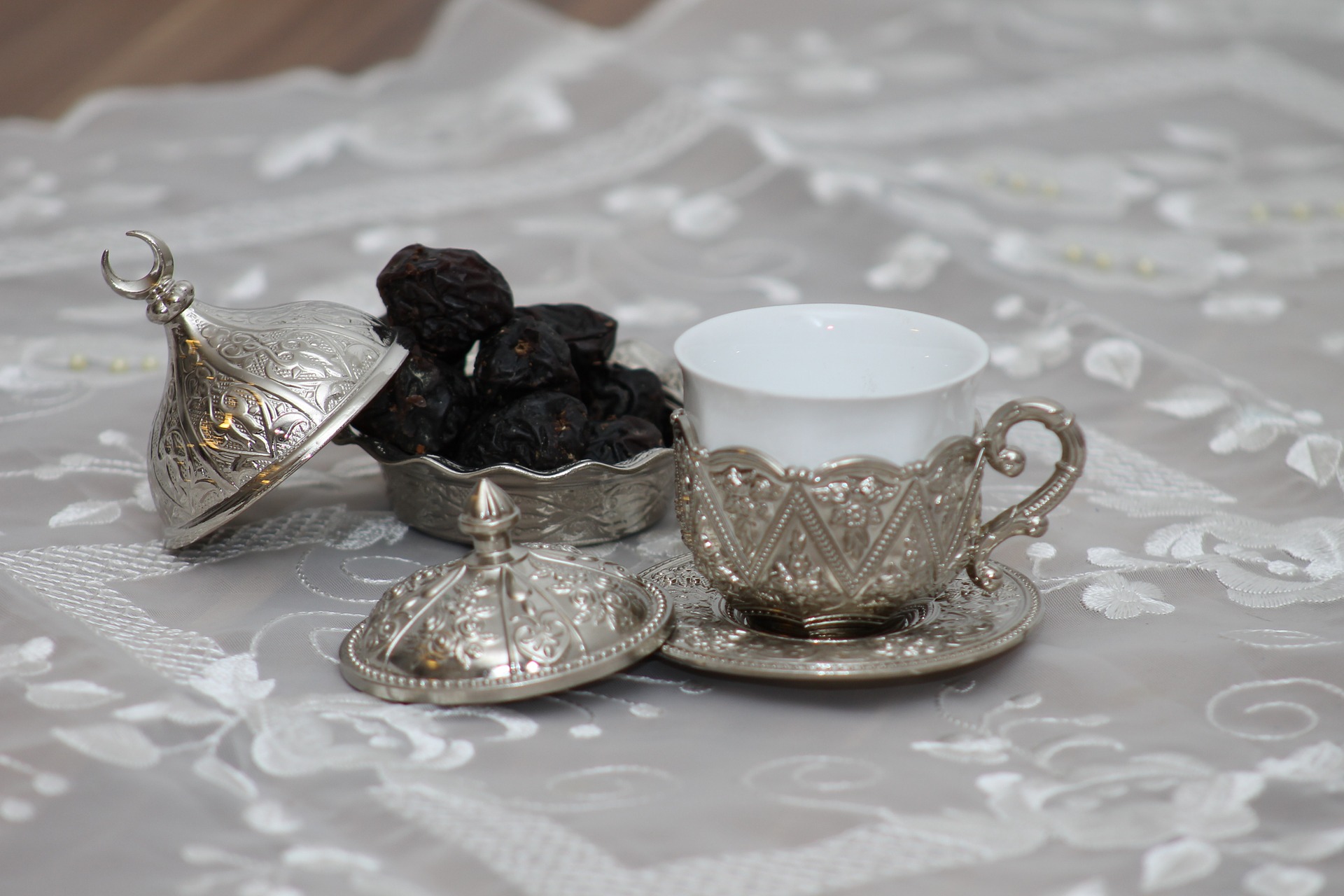During Ramadan you should aim to eat in a similar way to your normal everyday diet, unless your normal diet is full of junk or processed foods as they should be avoided all year round. Eat across all the food groups, particularly focusing on foods that will promote a slower rate of digestion which will help maintain energy levels during the fasting hours. This is particularly important for Suhoor. Many do well by eating smaller meals more regularly, during the non fasting hours.
Also it is important to eat slowly, it is very tempting to devour food after the long fasting hours but this will lead to overeating and problems with digestion. The first stage of digestion happens in the mouth, with chewing and enzymes in our saliva. Try putting your fork down in between mouthfuls, or engaging in conversation to prevent you from eating too quickly.
Be sure to boost dietary fibre during Ramadan as this will help to regulate blood sugar, to prevent constipation and also feed the good bacteria which are so important for well-being (moods, immunity, digestion). Fibre is a type of complex carbohydrate and it is recommended that men and women consume 38g and 25g daily, respectively. The slower rate of digestion, when including dietary fibre, avoids spikes in blood sugar levels which helps when fasting. Conversely, simple and refined carbohydrates such as sugar rich foods, sodas, sweets, white bread and instant white rice will digest at a faster rate, leading to energy slumps. Ways to increase fibre content in your Ramadan eating plan include keeping the skin on fruits and vegetables. You can also add beans or lentils to meals and a tablespoon or two of high fibre milled flaxseeds to yogurts/salads/soups.
The rate at which different carbohydrates raise blood sugar levels can be measured using the Glycemic Index (GI), with a lower GI indicating lower blood sugar levels and slower digestion. There are ways to lower the GI of a food, for example eating carbohydrates with a protein or a fat will slow the rate of digestion (brown rice and chicken or peanut butter on rye bread), preventing blood sugar spikes and energy slumps. Another way to slow digestion time is to opt for foods that are less cooked or processed, for example slightly undercooked pasta will have a lower GI. Adding a little lemon juice or vinegar will also help slow stomach emptying time, reducing the GI of carbs.
Make sure each meal has a good balance of vegetables (should fill half the plate), protein (around a quarter of the plate), low GI and wholegrain carbs (around a quarter of the plate) and a little healthy fat (avocados, olive oil, coconut oil, organic ghee, grass-fed butter, nuts and seeds).
Always start Iftar with rehydrating, drinking water and perhaps some coconut water or tea, with a piece of fruit, this will help to raise sugar levels gradually and all will help hydrate the body after the fast. Another great way to open the fast is by drinking a soup, perhaps a chilled version to both rehydrate and cool the body down or a traditional lentil based soup, the lentils are complex carbs that will act to raise blood sugar levels slowly. Consuming complex carbs (beans, lentils, brown rice, ), along with good sources of protein(chicken, lamb, fish, eggs) and good fats (avocados, nuts, seeds, olive oil) should form the basis of each meal.
Try really hard to eat slowly, chewing every bite very well as this will aid digestion and prevent overeating.
You want to consume at least 2 litres of water. It is a good idea to sip on water regularly during the non-fasting hours, to help you stay hydrated during the day. Refrain from activities that will cause dehydration during the day such as exercise or physical work, save it for after you have broken the fast.
We can also be hydrated from the foods we eat, for example certain vegetables like cucumbers, lettuce, celery, zucchini/courgettes and eggplant/aubergine are mostly water so they will rehydrate you. Fresh fruits are another great source of hydration with tomatoes, watermelon, grapefruit and apples being some of the best choices. The high water content of such fruit and veggies will also help us to feel fuller for longer, so we consume less calories overall. A super hydrating green smoothie can be made to pack a nutrient dense punch, adding some coconut water to the smoothie can add some well needed electrolytes, particularly if you are continuing to exercise in Ramadan.
For suhoor, it is very important to eat foods that have a slower rate of digestion, as this helps to keep energy levels elevated during the fasting hours. All carbohydrates are broken down into units of sugar but they do this at varying speeds. Choosing complex carbohydrates over simple carbohydrates will help maintain energy levels throughout the day. Simple carbohydrates consist of a chemical structure made up of no more than two units of sugar. Complex carbohydrates are larger in structure, consisting of at least three single units of sugar, which are usually linked together to form a chain. It is this complex structure that gives this group of foods a slower rate of digestion, making them an ideal choice for Ramadan.
Fasting is something that our bodies are genetically adapted to deal with. Let’s consider our hunter gatherer ancestors and their lack of instashop or inability to pop into to their local spinneys for immediate food; they would often go for long periods without food so of course we are programmed to be able to survive in such states.
Numerous studies have looked at the impact of fasting on health and some of the results are pretty impressive! If done in the correct way it can reduce oxidative stress and inflammation (key factors leading to chronic disease) and this has been shown to help alleviate symptoms of those with asthma. A study found that fasting during Ramadan helped a group of 50 individuals to lower some inflammatory markers. It can also helps to boost immunity, to balance fat regulating hormones such as adiponectin (fat burning) and leptin (controls satiety), to improve blood pressure, blood sugar and cholesterol levels (improve triglycerides and LDL particle size, while increasing HDL cholesterol). Studies have also shown fasting helps the body deal with stress at a cellular level as the fasting itself causes a stress response to be activated in the same way a mild stressor would. Over time this consistent build up makes our cells more resilient to stress, reducing cellular aging and disease development.
Many are able to lose weight fasting for a couple of reasons, firstly it is likely that you consume fewer calories when you are cutting out entire meals. Fasting in itself also helps weight loss as it puts your body into a fat burning state, breaking down the bodies fat stores to use as a fuel. When we eat the body will use glucose as a fuel rather than fat stores.

Article by Victoria Tipper






